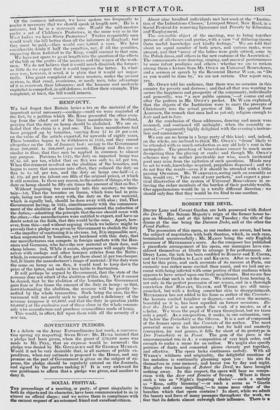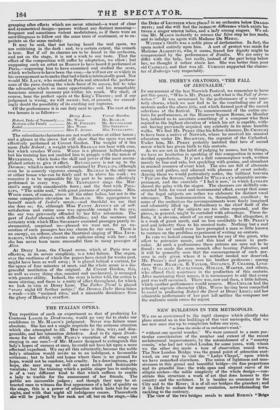ROBERT THE DEVIL.
DRURY Lane and Covent Garden are both possessed with Robert the Devil. His Satanic Majesty's reign at the former house be- gan on Monday, and at the latter on Tuesday ; the title of the drama at the one being the Deenzon Duke, and at the other the Fiend Father.
The possession of this opera, as our readers are aware, had been the subject of negotiation with both theatres, which, in each case, terminated unsuccessfully; Mr. MASON being the only English possessor of MEYERBEER s score. As the composer has published a pianoforte arrangement of his opera, our managers have con- sidered themselves at liberty to arrange it for performance. At Drury Lane, the task has been confided to BISHOP and T. Coo, and at Covent Garden to LACY and KEARNS. After so much con- test for this prize, and such accounts of its success at Paris, our curiosity was rather more excited than usual, and we laid our ac- count with being infected with some portion of that madness which appears to have seized upon our lively neighbours. But we are free to confess that such is not the case. We returned from hearing it, not only in the perfect possession of our senses, and in a thorough conviction that MOZART, GLUCK, and WEBER are still unap- proached, but with a feeling somewhat akin to disappointment. MEVERI3EER has not added to his fame as author of the Crociato : the horrors excited laughter or disgust,—and even the scenery, beautiful as it is, has been equalled on former occasions. Ro- bert the Devil is not so much the work of a master, as of a soholar. We trace the pupil of WEBER throughout, but we trace only a pupil. As a composition, it ranks, in our estimation, very far below the Freisehi;tz or the Oberon. It is a sort of compound of the former opera and the Crociato of the author. The most powerful scene is the incantation ; but for bold and masterly conception, for real genius, it falls far short of its prototype in Der Freischiitz or in Faust. The gem of the piece is the unaccompanied trio in A; a composition of very high order, and enough to make a name for an author. We might also specify portions of duets and concerted pieces cleverly put together, and effective. The opera lacks continuous melody. With all WEBER'S wildness and originality, the delightful sunshine of his melodies is continually gleaming upon you : - his airs fix themselves in your memory, and haunt you by day and night. But after two hearings of Robert the Devil, we have brought nothing away. In this respect, the opera will bear no compa- rison with the Azor and Zernira of SPOHR. Where is there such a trio as "Night's lingering shades"— such a melody as "Rose, softly blooming" —or such a scena as "Gentle thoughts and cares impelling,"—to name none other of the beauties which that opera contains ? In short, while we admit the beauty and force of many passages throughout the work, we fear that its defects almost outweigh their influence. There is a grasping after effects which are never attained—a want of clear and symmetrical design—pauses without any distinct meaning— frequent and sometimes violent modulations, as if there were an unwillingness to follow out the same train of sentiment, or to ex- patiate on the same melody.' It may be said, that not having heard the real opera, we are criticising in the dark : and, to a certain extent, the remark is true. But if all its charms are to be found in the orchestra, and not on the stage, it is not a work to our taste. That the effect of the composition will suffer by adaptation, we allow; but supposing such an artist as BISHOP to have heard it performed at Paris,—supposing him to have examined and studied the score, which we believe to have been the case,—he will not err so widely in his arrangement as to make that bad which is intrinsically good. Nor would Mr. LACY, who resided in Paris and attended the perform- ance of the piece during the whole furor of its season, fail to take the advantage which so many opportunities and his remarkably tenacious musical memory put within his reach. We shall, of course, hear the perfect opera at the King's Theatre ; and if our judgment is wrong, we will recant; but, at present, we exceed- ingly doubt the possibility of its exciting any raptures.
Of the performance it is our duty next to speak. The cast at the two houses is as follows—
Drury Lane. Covent Garden.
Robert, Duke of Normandy Mr. Woon . Mr. Bit HAM Bertram (the Fiend) Mr; H. PIIILLIPS Mr. REYNOLDSON Isabel Mrs. • Woon Miss SHIR RIFF Alice Miss F. AVTOY. Aliss I NVE RARITY.
The subordinate characters are not worth notice at either house ; and a glance at-the-above list will show that the opera was most effectively performed at Covent Garden. The weight of it lies upon Duke Robert; a weight which BRAHAM can bear with ease, but which crushes WOOD. Woon is a pleasant ballad-singer, but his training has not enabled him to grapple with the music of MEYERBEER, which tasks the skill and power of the most accom- plished artists to give it effect. REYNOLDSON is not up to the Demon; which is more worthily sustained by PHILLIPS, although .even he is scarcely vigorous enough. BRAHAM is the only man at either house who can be fairly said to be above his work : we conceive it to be impossible for his part to be more effectively performed in every way. Mr. TEMPLETON sings the Min- strel's song with considerable force ; and the duet with PHIL- uPS,. "The noble soul," with great justness of expression. Mrs. Woos soars, of course, above all the other ladies, but not to the _ same comparative elevation as BRAHAM; She appropriates to herself much of Isabers music,—and thankful we are that . she does so; for, although Miss FANNY AYTON'S air of self. satisfaction and entire ease was agreeable enough to the eye, the ear was grievously offended by her false intonation. The part of Isabel abounds with difficulties; and the neatness and certainty with which Miss SHIRREFF executed passages purely in- strumental, surprised us—pleased we were not, for no ex- ecution of such passages has any charm for our cars. There is an energy, an ardour, about the theatrical singing of Miss NYE- RARITY, which always carries an audience along with her ; and she has never been more successful than in many passages of Alice.
At Drury Lane, the Chapel scene, which at Paris was so effective, in its severe simplicity, is a total failure. The organ, over the costliness of which the papers have rioted for weeks past, might have been as well away; it is played behind a curtain, for the space of four minutes at most, and the whole scene is a dis- graceful mutilation of the original. At Covent Garden, this, as well as every thing else, musical and mechanical, is managed with greater ability. ''Indeed, the story is better told, the action is more stirring, and there is a unity of effect throughout, for which we look in vain at Drury Lane. The Father Fiend is played "every night till further notice ;" the Demon Duke threa times a week—with "maimed rites," and a miserable decadence from the glory of Monday's overflow.



























 Previous page
Previous page